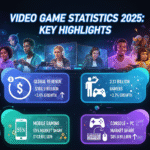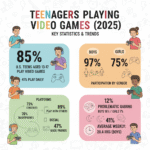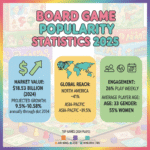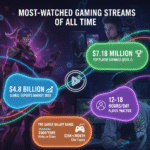Sleep Patterns of Hardcore Gamers in 2026
wp:html
html
The sleep patterns of hardcore gamers in 2026 show significant deviations from general population norms. Research examining thousands of gamers worldwide reveals that intensive gaming habits correlate with delayed sleep schedules, extended sleep onset latency, and widespread reports of poor sleep quality. While many gamers achieve nominally adequate sleep duration, the timing and quality of their rest remain substantially compromised.
Understanding gamer sleep patterns has become increasingly relevant as mobile gaming continues expanding and competitive gaming attracts millions of participants globally. The interplay between gaming intensity, Internet Gaming Disorder, and sleep disturbances presents both public health concerns and performance implications for competitive players.
Sleep Onset Latency Among Hardcore Gamers and Competitive Players
Sleep onset latency represents the time required to transition from full wakefulness to sleep. In general populations, healthy individuals typically fall asleep within 10 to 20 minutes. However, gaming sleep patterns show considerably longer sleep initiation times.
Average Sleep Onset Latency in Gamer Populations
International studies of adult gamers document an average sleep onset latency of 24.63 minutes. This figure positions gamers at the higher end of normal sleep latency ranges, suggesting that gaming activities particularly evening gaming sessions create conditions that delay sleep initiation. The extended latency period appears linked to both the stimulating nature of gaming content and the blue light exposure from screens during late-night play sessions.
Evening gaming sessions show especially pronounced effects on sleep timing. Research using both subjective reports and objective measures confirms that nights with heavier gaming activity correlate with delayed sleep metrics. The cognitive arousal from competitive gaming, combined with the social elements of online multiplayer experiences, creates a state of heightened alertness that extends well beyond the end of gaming sessions.
Similar to how sweaty gameplay demands intense concentration and effort, late-night gaming sessions require sustained attention that interferes with natural sleep preparation processes. The mental activation from trying to achieve victory or improve rankings does not dissipate immediately when players stop gaming.
Gaming Sleep Duration and Distribution Patterns
Contrary to assumptions that hardcore gamers sacrifice sleep entirely, data reveals a more nuanced picture regarding sleep duration among gaming populations.
How Many Hours Do Gamers Actually Sleep
International gamer samples show an average sleep duration of 8.42 hours, with 64.5 percent of gamers reporting sleep durations within the standard 7 to 9 hour range considered adequate for adults. These figures suggest that many gamers do allocate sufficient time for sleep, challenging stereotypes about gamers as chronically sleep-deprived.
However, duration alone does not tell the complete story. While hardcore gamer sleep duration may appear adequate on paper, the quality and timing of that sleep often remains problematic. Studies from Jordan University students found that 64.6 percent reported poor sleep quality despite potentially adequate sleep durations. This disconnect between quantity and quality represents a key characteristic of gaming sleep patterns.
| Sample Population | Average Sleep Duration | Poor Sleep Quality Prevalence |
|---|---|---|
| International Gamers | 8.42 hours | 58.7% fair to very poor |
| Jordan University Students | Not specified | 64.6% poor quality |
The prevalence of poor sleep quality among gamers suggests that circadian misalignment, sleep fragmentation, and reduced sleep efficiency undermine the restorative value of the hours spent in bed. Just as one-trick pony players focus intensively on mastering single characters, hardcore gamers often concentrate their gaming during specific late-night windows that conflict with optimal sleep timing.
Delayed Chronotypes and Shifted Sleep Schedules in Gaming Communities
Hardcore gamer sleep schedules show marked shifts toward later bedtimes and wake times compared to general populations.
Prevalence of Late Night Gaming Sleep Patterns
Research documents that 51 percent of gamers report bedtimes falling in late evening or early morning hours. The average wake time among gaming populations sits at 8:28 AM, reflecting a schedule shifted approximately 1 to 2 hours later than typical work or school schedules for non-gaming populations.
These delayed sleep-wake patterns create several challenges. Gamers following such schedules often experience social jet lag when their gaming-adapted chronotype conflicts with conventional daytime obligations. Weekend gaming marathons can further shift circadian rhythms, making Monday morning transitions particularly difficult.
The phenomenon mirrors patterns seen in TTV streamers who broadcast during peak evening and late-night viewing hours. The streaming schedule incentivizes remaining awake and active during times when most viewers are available, regardless of the streamer’s natural chronotype preferences.
Why Gaming Promotes Later Sleep Schedules
Multiple factors drive the delayed sleep patterns observed in gaming communities. Online multiplayer games create strong social incentives to play when friends and teammates are available, often during evening hours. Competitive ranked systems encourage extended play sessions to maintain or improve standings. The variable reward schedules inherent in many game designs create difficulty with stopping gameplay at predetermined times.
Additionally, many gamers work conventional hours or attend school during the day, relegating gaming to evening and nighttime hours. This pattern becomes self-reinforcing as late gaming shifts circadian rhythms later, making earlier sleep increasingly difficult even on nights without gaming.
Internet Gaming Disorder Prevalence and Sleep Quality Correlations
Internet Gaming Disorder represents a clinical condition characterized by impaired control over gaming, prioritization of gaming over other activities, and continuation of gaming despite negative consequences. The relationship between IGD and sleep disturbances shows consistent patterns across multiple studies.
Gaming Disorder Sleep Problems Statistics
Among Jordan University students, 15.2 percent met criteria for Internet Gaming Disorder. Within this same population, 64.6 percent reported poor sleep quality, with IGD status serving as a significant predictor of sleep problems. Binary logistic regression analysis revealed that individuals with IGD showed 1.88 times higher odds of experiencing poor sleep quality compared to those without the disorder.
Medical student populations show even more striking patterns. Among students classified as abnormal gamers based on their gaming intensity, 92 percent reported poor sleep quality, compared to 80.3 percent among normal gamers. While both groups showed high rates of sleep problems, the difference between groups reached statistical significance.
Meta-analyses examining problematic gaming patterns consistently demonstrate that individuals with gaming disorders report more adverse outcomes across multiple sleep dimensions including duration, quality, and daytime sleepiness compared to non-problematic gamers. The relationship appears bidirectional, with poor sleep also predicting increased gaming behavior in some studies.
Sleep as a Mediator Between Gaming and Behavioral Problems
Recent longitudinal research positions sleep quality not merely as a consequence of excessive gaming, but as a mediating mechanism linking Internet Gaming Disorder to other behavioral outcomes. Three-wave longitudinal studies found that IGD symptoms predicted deteriorating sleep quality, which subsequently predicted increased conduct problems among adolescents.
This mediating role suggests that sleep disturbances represent more than a side effect of excessive gaming. Instead, impaired sleep appears to function as a pathway through which gaming disorders contribute to broader mental health and behavioral difficulties. The mediation effect accounted for approximately 17.3 percent of the total relationship between IGD and conduct problems.
Understanding this mediating role has implications for intervention strategies. Rather than solely targeting gaming reduction, interventions addressing sleep quality may provide additional benefits for individuals with gaming disorders. Similar to how competitive players might analyze their well-played matches to improve performance, examining and optimizing sleep patterns offers a practical intervention point.
Esports Performance and Acute Sleep Deprivation Effects
While chronic sleep problems plague gaming communities, research on acute sleep deprivation presents surprising findings regarding short-term performance impacts.
Gaming Performance After 29 Hours Without Sleep
Experimental research examining total sleep deprivation effects on esports performance recruited 40 Rocket League players and subjected half to approximately 29 hours of continuous wakefulness before competitive play. Despite this extreme sleep deprivation producing measurable increases in subjective sleepiness, decreased alertness and motivation, and significantly impaired performance on cognitive tests, overall in-game performance showed no significant degradation.
Players subjected to sleep deprivation demonstrated response times approximately 50 milliseconds slower on vigilance tasks and experienced nearly five times more lapses in attention during testing. However, when these same sleep-deprived players competed in actual Rocket League matches, their game outcomes remained statistically equivalent to performance when well-rested.
Exploratory analyses suggested potential strategic shifts, with sleep-deprived players possibly adopting simpler and safer gameplay approaches. This compensation mechanism may allow experienced gamers to maintain performance despite compromised cognitive function, at least in the short term and for certain game types.
Limitations and Implications for Competitive Gaming
The finding that 29 hours without sleep did not degrade Rocket League performance should not be interpreted as evidence that sleep is unimportant for esports athletes. Several important caveats apply. The study examined a single gaming session after acute sleep deprivation, not the effects of chronic sleep restriction. Rocket League’s fast-paced, mechanically-focused gameplay may be less susceptible to sleep loss compared to games requiring sustained attention or complex strategic thinking.
Additionally, elite-level performance under optimal conditions likely requires adequate sleep even if baseline competence persists during acute sleep loss. The cumulative effects of repeated sleep deprivation over tournament weekends or competitive seasons remain concerning even if single-session performance appears preserved. Just as understanding when to forfeit requires game sense, recognizing when sleep deprivation threatens performance requires self-awareness and monitoring.
Competitive Gaming Sleep Challenges and Professional Player Schedules
Professional esports players face unique sleep challenges stemming from tournament schedules, travel demands, and training intensity.
Tournament Sleep Disruption Patterns
Major esports tournaments often span multiple days with match schedules that vary daily. Players may compete in early morning matches one day and late evening matches the next, preventing consistent sleep schedules. International tournaments add jet lag challenges, with players traveling across multiple time zones shortly before competition.
Practice and scrimmage schedules for professional teams typically concentrate during evening hours when all team members are available. For teams with international rosters, finding overlapping waking hours can push practice sessions into late-night or early-morning time slots for some players. The demanding practice schedules leave limited time for adequate sleep recovery.
Streaming commitments add another layer of sleep challenge. Many professional players supplement tournament winnings with streaming revenue, requiring them to broadcast during peak viewing hours. Balancing streaming schedules, team practice, tournament preparation, and adequate sleep creates difficult trade-offs. Much like managing resources across cross-platform gaming experiences, professional players must allocate limited time across competing demands.
Blue Light Exposure and Screen Time Effects on Gamer Sleep Onset
Screen exposure during evening gaming sessions affects sleep through multiple mechanisms beyond simple time displacement.
How Gaming Screens Disrupt Natural Sleep Timing
Electronic screens emit blue wavelength light that suppresses melatonin production. Melatonin serves as the body’s primary sleep signal, with rising melatonin levels in the evening promoting sleepiness. Gaming during evening hours exposes players to blue light during the exact period when melatonin should be increasing to prepare the body for sleep.
Research on light exposure before bedtime demonstrates that room light exposure suppresses melatonin onset and shortens melatonin duration in humans. Gaming sessions occurring within 2 to 3 hours of intended bedtime create particularly strong sleep disruption through this mechanism. The bright, dynamic visual content of games produces more intense light exposure than passive screen activities like reading.
The cognitive and emotional engagement of gaming compounds the light exposure effects. Competitive gaming activates stress response systems, elevating heart rate and core body temperature. These physiological changes oppose the natural temperature decline and cardiovascular quieting that normally facilitate sleep onset. The combination of light exposure, cognitive arousal, and physiological activation creates a particularly challenging context for sleep initiation.
Daytime Sleepiness and Functional Impairment in Gaming Populations
Poor sleep quality and delayed sleep schedules produce consequences that extend beyond nighttime rest, affecting daytime functioning and overall wellbeing.
Academic and Occupational Performance Effects
Studies examining gamers across different occupational categories reveal significant differences in sleep quality. Unemployed gamers reported the poorest sleep quality, while students, part-time workers, and full-time employees showed moderately better but still concerning sleep quality scores. Sleep onset latency varied by employment status, with unemployed gamers showing the longest delays at 33 minutes on average, compared to 24 minutes for full-time workers.
The relationship between gaming, sleep, and academic or work performance creates a complex feedback loop. Poor sleep from late-night gaming impairs daytime functioning, which may reduce academic or work performance. Reduced performance and productivity may create additional stress or free time, potentially increasing gaming as a coping mechanism or time-filling activity.
Educational attainment shows associations with game-related sleep delays. Individuals with graduate degrees showed higher rates of never delaying bedtime for gaming compared to those with high school education only. This pattern suggests either that educational attainment promotes better sleep hygiene despite gaming, or that individuals who maintain better sleep boundaries achieve higher educational levels.
Age and Gender Differences in Gaming Sleep Patterns
Demographic factors modify the relationship between gaming and sleep disturbances.
How Gaming Affects Sleep Across Age Groups
Age correlates with multiple sleep parameters in gaming populations. Older gamers tend to wake earlier, sleep for shorter durations, and experience shorter sleep onset latency compared to younger gamers. Age also predicts frequency of game-related bedtime delays, with younger gamers reporting more frequent delays than older gamers.
Individuals reporting frequent game-related bedtime delays average approximately 24.5 years of age, compared to 27.3 years for those never experiencing such delays. The age difference, while modest, suggests that younger gamers face particular vulnerability to gaming-related sleep disruption. This pattern may reflect both greater gaming engagement among younger individuals and better developed self-regulation regarding gaming among older players.
Gender Patterns in Gaming Disorder and Sleep Quality
Internet Gaming Disorder shows significantly higher prevalence among males compared to females across multiple studies. However, poor sleep quality presents a more complex gender pattern. While IGD affects males disproportionately, poor sleep quality is more frequently observed among female gamers in several studies.
The mediation effect of sleep quality between gaming disorder and behavioral problems shows stronger total and direct effects in boys compared to girls, though sleep quality serves as a mediator for both genders. These patterns suggest that while males face higher rates of gaming disorder, sleep disturbances affect both genders among gaming populations, with potentially different pathways and mechanisms.
Social Gaming Dynamics and Late Night Play Patterns
The social nature of modern gaming creates powerful incentives for late-night play that operate independently of individual preferences.
Multiplayer Gaming and Peer Sleep Schedules
Online multiplayer games create situations where individual sleep schedules become interdependent with friend group availability. Players who want to participate in team-based activities must coordinate schedules with teammates, often resulting in play sessions that accommodate the latest schedule among the group.
Competitive ranked systems in many multiplayer games create additional pressure to play during peak hours when queue times are shortest and competition is most active. Off-peak gaming may result in longer wait times, skill-mismatched opponents, or difficulty finding full teams. These structural features of game design effectively penalize early sleepers and reward those who maintain late-night availability.
Guild systems, clan commitments, and scheduled raid times in MMORPGs formalize social obligations around gaming schedules. Missing scheduled group activities risks social standing within gaming communities or loss of guild membership. These social consequences create strong incentives to prioritize gaming attendance over sleep timing. The dynamics parallel team communication patterns where saying “nice try” maintains group cohesion even after failures, with the group’s social fabric depending on consistent participation.
Sleep Hygiene Recommendations for Gamers
While comprehensive treatment of sleep problems falls outside this analysis’s scope, basic sleep hygiene principles offer starting points for gamers seeking improved sleep.
Timing Gaming Sessions for Better Sleep
Establishing a consistent bedtime independent of gaming results provides the foundation for improved sleep. Setting and adhering to a firm stop time for gaming, ideally 1 to 2 hours before intended sleep, allows time for physiological arousal to decrease. Using timers or automatic shutdown features helps maintain boundaries when motivation to continue playing is high.
Finishing gaming sessions with less stimulating content eases the transition toward sleep. Switching from competitive ranked matches to casual modes, or from first-person shooters to slower-paced games, reduces cognitive and emotional arousal before bed. Completely stopping all screen activities 30 to 60 minutes before sleep provides the most benefit for circadian alignment.
Environment and Equipment Considerations
Using blue light filtering software or hardware during evening gaming sessions reduces melatonin suppression. Most operating systems now include built-in night mode features that shift display colors toward warmer tones. Gaming glasses with blue light filtering provide an alternative approach. However, these interventions only partially mitigate screen effects and do not address arousal from gameplay itself.
Maintaining cool bedroom temperatures, minimizing light exposure, and using blackout curtains or eye masks helps consolidate sleep for gamers whose schedules force sleep during daylight hours. White noise machines or earplugs reduce sleep disruption from household activities for those sleeping while others remain awake.
Treatment Considerations for Gaming Disorder and Sleep Problems
When gaming behavior and sleep disturbances reach clinical significance, professional intervention may be warranted.
Addressing Gaming Disorder Through Sleep Interventions
The mediating role of sleep quality in the relationship between gaming disorder and behavioral problems suggests that sleep-focused interventions may provide benefits beyond simply improving rest. Cognitive behavioral therapy for insomnia adapted for gaming populations could address both sleep and gaming behaviors simultaneously.
Interventions might help individuals recognize how poor sleep increases vulnerability to excessive gaming by impairing self-regulation. Sleep restriction therapy combined with stimulus control could help reset circadian rhythms while also breaking associations between bedtime and gaming urges. However, such interventions require professional guidance to implement safely and effectively.
For individuals with comorbid gaming disorder and sleep disturbances, addressing both issues concurrently likely produces better outcomes than treating either in isolation. The bidirectional relationship between gaming and sleep means that improvements in one domain support improvements in the other.
Future Research Directions in Gaming and Sleep Studies
Current understanding of gaming and sleep relationships contains significant gaps requiring further investigation.
Longitudinal Studies and Causation Questions
Most research examining gaming and sleep uses cross-sectional designs that cannot establish causation. Does excessive gaming cause sleep problems, do sleep problems promote excessive gaming, or does a third factor cause both? Longitudinal studies following gamers over extended periods would clarify temporal relationships and identify vulnerability factors for developing problems.
The recent three-wave longitudinal study demonstrating sleep quality as a mediator between gaming disorder and conduct problems exemplifies the value of such designs. However, additional longitudinal work with longer follow-up periods and larger samples would strengthen understanding of how gaming habits and sleep patterns co-evolve over time.
Game-Specific Sleep Effects Research
Different game genres may produce distinct sleep effects. First-person shooters with rapid reaction requirements might create different arousal patterns than turn-based strategy games. Massively multiplayer online games with scheduled raid times produce different social pressures than single-player games. Research systematically comparing sleep effects across game types would inform more nuanced recommendations.
The finding that acute sleep deprivation did not impair Rocket League performance suggests that some games may be more resilient to sleep loss than others. Investigating whether this pattern holds for games requiring sustained attention, such as MOBAs, or games demanding complex strategic thinking, would clarify when sleep loss most threatens performance. This knowledge could guide training schedules and tournament preparation for competitive FPS players and other esports athletes.
FAQs
What is the average sleep onset latency for hardcore gamers?
Research on international gamer samples shows an average sleep onset latency of 24.63 minutes. This exceeds the typical 10 to 20 minute range observed in general populations, indicating that gamers take longer to fall asleep after getting into bed. Evening gaming sessions particularly contribute to extended sleep onset times through both blue light exposure and cognitive arousal from gameplay.
Do gamers get enough sleep hours per night?
Many gamers achieve adequate sleep duration, with 64.5 percent reporting 7 to 9 hours of sleep and an overall average of 8.42 hours. However, sleep duration alone does not indicate sleep quality. Studies show that 58.7 to 64.6 percent of gamers report fair to very poor sleep quality despite nominally adequate sleep hours, suggesting issues with sleep timing, fragmentation, or efficiency rather than simple duration deficits.
How common is Internet Gaming Disorder among university students?
Studies of university students show Internet Gaming Disorder prevalence around 15.2 percent, with significantly higher rates among males compared to females. IGD correlates strongly with poor sleep quality, with affected individuals showing 1.88 times higher odds of sleep problems. Among gaming populations overall, between 2.4 and 25.7 percent meet IGD criteria depending on the specific population studied and diagnostic criteria used.
Does sleep deprivation affect gaming performance?
Research on acute sleep deprivation shows complex results. In Rocket League players subjected to 29 hours without sleep, overall game performance remained unchanged despite significant impairments in cognitive testing and subjective alertness. However, this finding applies only to single gaming sessions after acute deprivation. Chronic sleep restriction likely produces cumulative performance decrements, and effects may vary by game type. Games requiring sustained attention or complex strategy may show greater vulnerability to sleep loss than mechanically-focused games.
What percentage of gamers have delayed sleep schedules?
Approximately 51 percent of gamers report bedtimes falling in late evening or early morning hours, with average wake times around 8:28 AM. This represents a sleep schedule shifted 1 to 2 hours later than typical non-gaming populations. The delayed pattern stems from multiple factors including evening availability of multiplayer opponents, social gaming commitments, and the need to fit gaming around daytime work or school obligations.
Can improving sleep help reduce gaming disorder symptoms?
Evidence suggests sleep quality serves as a mediator between Internet Gaming Disorder and behavioral problems. Longitudinal studies show that IGD symptoms predict poorer sleep quality, which in turn predicts increased conduct problems, with sleep quality accounting for approximately 17.3 percent of this relationship. This pattern indicates that interventions targeting sleep quality may provide benefits beyond improving rest, potentially reducing some negative outcomes associated with gaming disorders. However, comprehensive treatment should address both sleep and gaming behaviors rather than focusing solely on either.
Why do gamers have poor sleep quality despite adequate sleep duration?
Multiple factors contribute to poor sleep quality among gamers despite adequate time in bed. Delayed sleep timing creates circadian misalignment, where sleep occurs at non-optimal circadian phases. Blue light exposure from screens suppresses melatonin and delays circadian rhythms. Cognitive and emotional arousal from competitive gaming persists after play stops, interfering with sleep initiation. Game-related night awakenings interrupt sleep continuity. The combination of these factors means that 8 hours in bed does not necessarily produce 8 hours of restorative sleep.
Are professional esports players at risk for sleep problems?
Professional esports athletes face multiple sleep challenges including irregular tournament schedules, international travel and jet lag, intensive practice demands during evening hours, streaming commitments during peak viewer times, and the pressure to maintain performance despite suboptimal sleep. While acute sleep deprivation may not immediately degrade performance in some game types, chronic sleep restriction likely accumulates negative effects on health, cognitive function, and competitive performance over time. Professional players require attention to sleep hygiene similar to traditional sport athletes.
Citations
- Smithies T, Toth A, Campbell M. Sleep Characteristics of an International Sample of Adult Gamers. PMC. 2024. Available from: https://pmc.ncbi.nlm.nih.gov/articles/PMC11152628/
- Al-Khawaldeh M, Al-Dwairi A, Abu-Snieneh H. Internet Gaming Disorder and Sleep Quality among Jordanian University Students: A Cross-sectional Study. Clinical Practice and Epidemiology in Mental Health. 2024. Available from: https://www.sciencedirect.com/org/science/article/pii/S1745017924000215
- Smithies T, Toth A, Campbell M. The Effect of Total Sleep Deprivation on the Cognitive and In-Game Performance of Rocket League Esport Players. Nature and Science of Sleep. 2024. Available from: https://pmc.ncbi.nlm.nih.gov/articles/PMC11669541/
- Peng P, Jin J, Chen Z, Ren S, He Y, Li J, et al. Impaired sleep quality mediates the relationship between internet gaming disorder and conduct problems among adolescents: a three-wave longitudinal study. BMC Public Health. 2026. Available from: https://pubmed.ncbi.nlm.nih.gov/40119352/
- Sleep Foundation. Sleep Latency: How Long It Takes to Fall Asleep. 2026. Available from: https://www.sleepfoundation.org/how-sleep-works/sleep-latency
/wp:html





